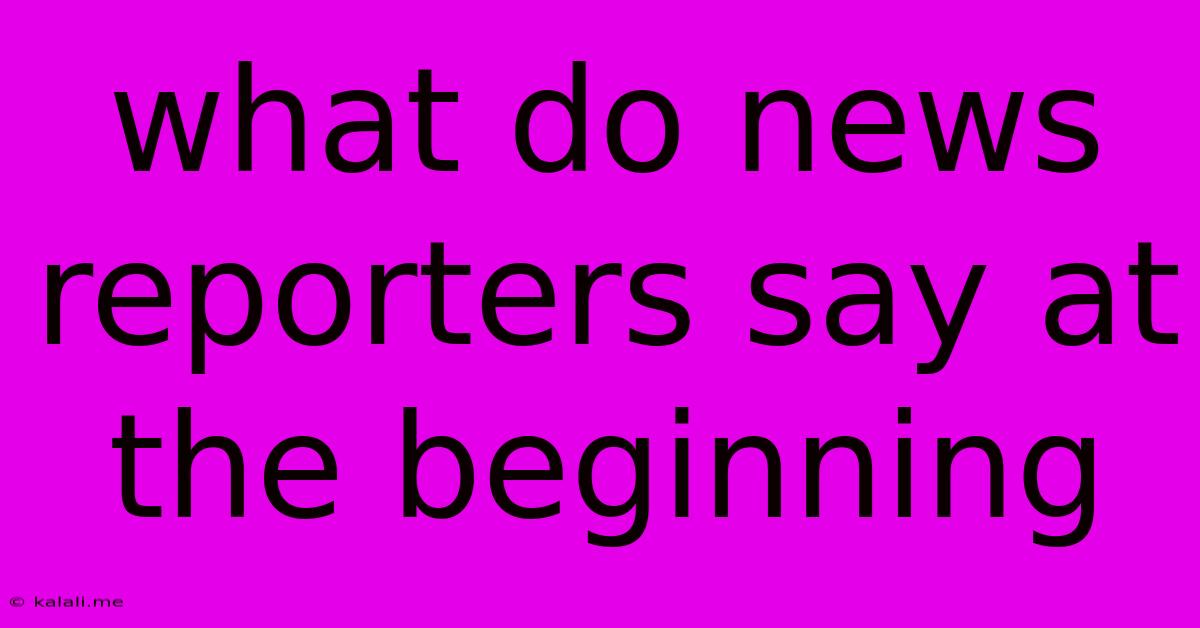What Do News Reporters Say At The Beginning
Kalali
Jun 15, 2025 · 3 min read

Table of Contents
What Do News Reporters Say at the Beginning? A Guide to News Openings
News reporters don't just jump straight into the story. The opening, often called the "lead" or "intro," is carefully crafted to grab the viewer's attention and set the stage for the report. This article explores the various components and styles of news openings, helping you understand what makes a compelling beginning to a news piece.
Understanding the Purpose of the News Opening
The primary goal of a news opening is to quickly and effectively communicate the most important information. This is often achieved in a concise and impactful manner, setting the tone and context for the rest of the report. Think of it as a hook designed to keep the audience engaged. A strong lead will answer the crucial questions: who, what, when, where, and why (and sometimes how).
Common Phrases and Structures Used in News Openings
While there's no single "magic phrase," several common structures and phrases are frequently used:
- Direct Lead: This is the most common approach, stating the most important facts upfront. Examples:
- "A major fire has ripped through downtown, leaving several businesses destroyed."
- "Thousands of people are expected to march on the capital today to protest new government policies."
- Question Lead: Starting with a question can draw the audience in, prompting curiosity. However, it should be used sparingly and only when appropriate. Examples:
- "What will the impact be of the new trade deal on local farmers?"
- "How will the city respond to the recent surge in crime?"
- Anecdotal Lead: Beginning with a short, compelling story can make the news more relatable and human. Examples:
- "Seven-year-old Sarah is still recovering from injuries sustained during last week's storm." (followed by the broader story about the storm)
- Descriptive Lead: Painting a vivid picture with sensory details can captivate the audience, especially for visual media. Examples:
- "Smoke filled the air, the sound of sirens echoing through the devastated streets."
Beyond the Words: Delivery and Tone
The way a reporter delivers the opening is just as important as the words themselves. The tone should be:
- Authoritative: Projecting confidence and credibility.
- Clear and concise: Avoiding jargon and complicated sentences.
- Objective: Presenting facts without personal bias.
- Engaging: Maintaining a conversational yet professional style.
Key Considerations for Effective News Openings:
- Knowing your audience: Tailor your language and style to resonate with your target viewers.
- Time constraints: News openings need to be succinct, often fitting within a limited time slot.
- Visuals: The opening should complement the accompanying video or images.
- Accuracy: Fact-checking is paramount.
Examples of Successful News Openings:
Observe how different news outlets handle their introductions. Analyze their techniques and identify what makes them effective. Note the use of concise language, strong verbs, and a focus on the most important information.
Conclusion:
Mastering the art of the news opening is crucial for effective news reporting. By understanding the different techniques and principles involved, reporters can create compelling introductions that grab the audience's attention and set the stage for a successful news report. Remember to prioritize clarity, accuracy, and engagement to make your news opening truly impactful.
Latest Posts
Latest Posts
-
Is 29 Prime Or Composite Number
Jun 15, 2025
-
Find The Current In Resistor R
Jun 15, 2025
-
Choose The Sentence That Is Grammatically Correct
Jun 15, 2025
-
What Is The Hybridization For Xe In The Xef2 Molecule
Jun 15, 2025
-
Which Word Equation Represents The Process Of Photosynthesis
Jun 15, 2025
Related Post
Thank you for visiting our website which covers about What Do News Reporters Say At The Beginning . We hope the information provided has been useful to you. Feel free to contact us if you have any questions or need further assistance. See you next time and don't miss to bookmark.